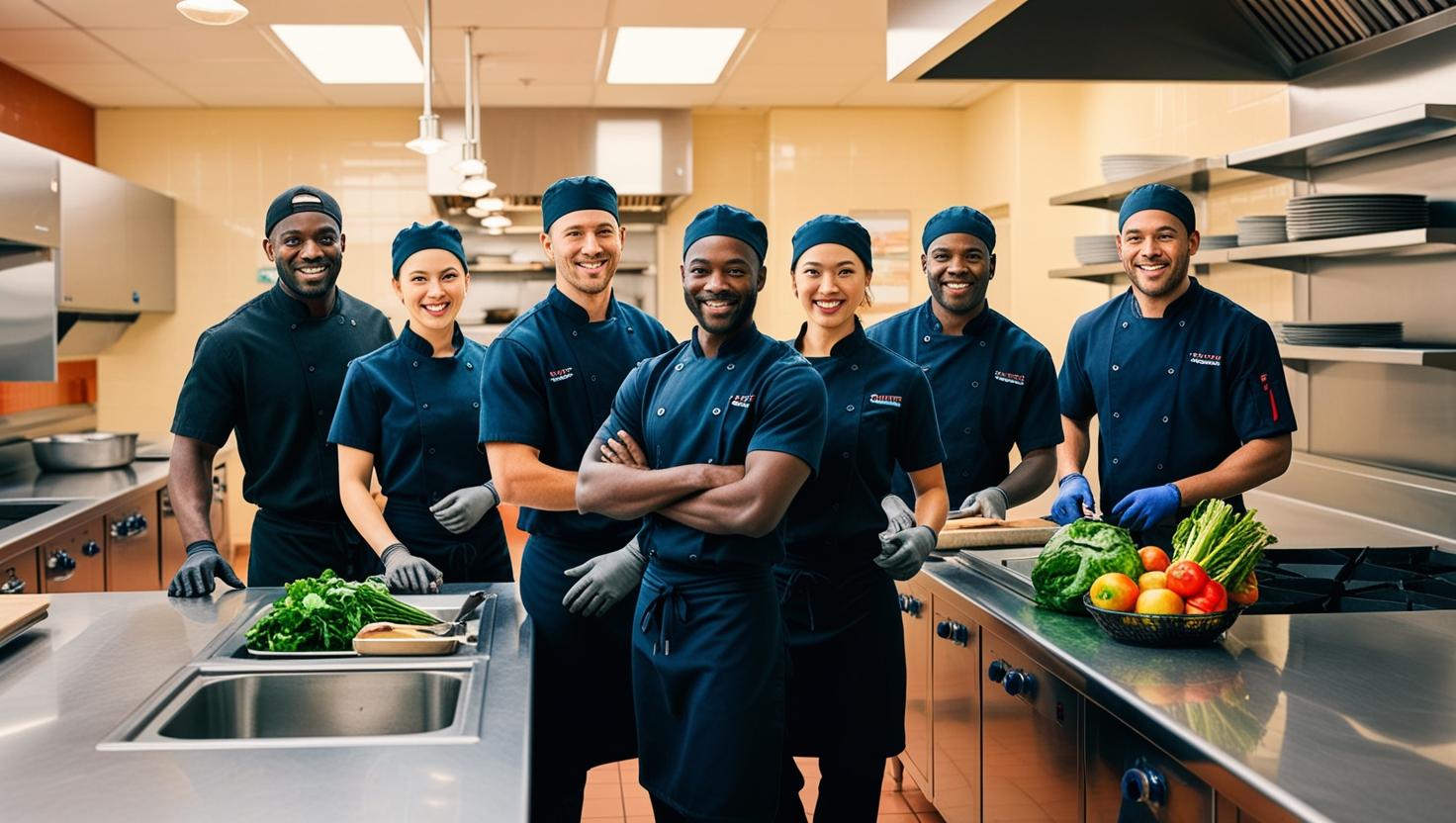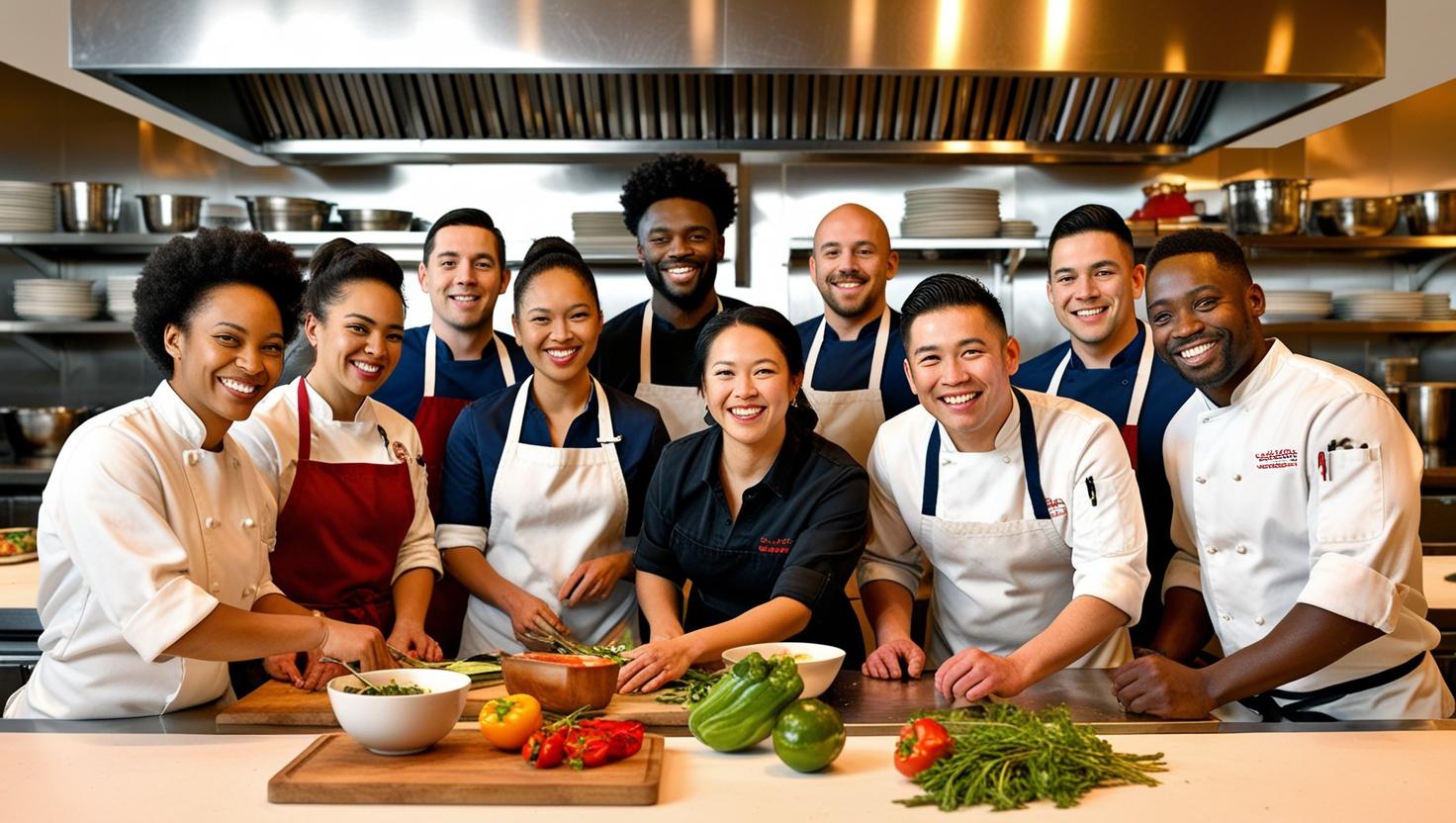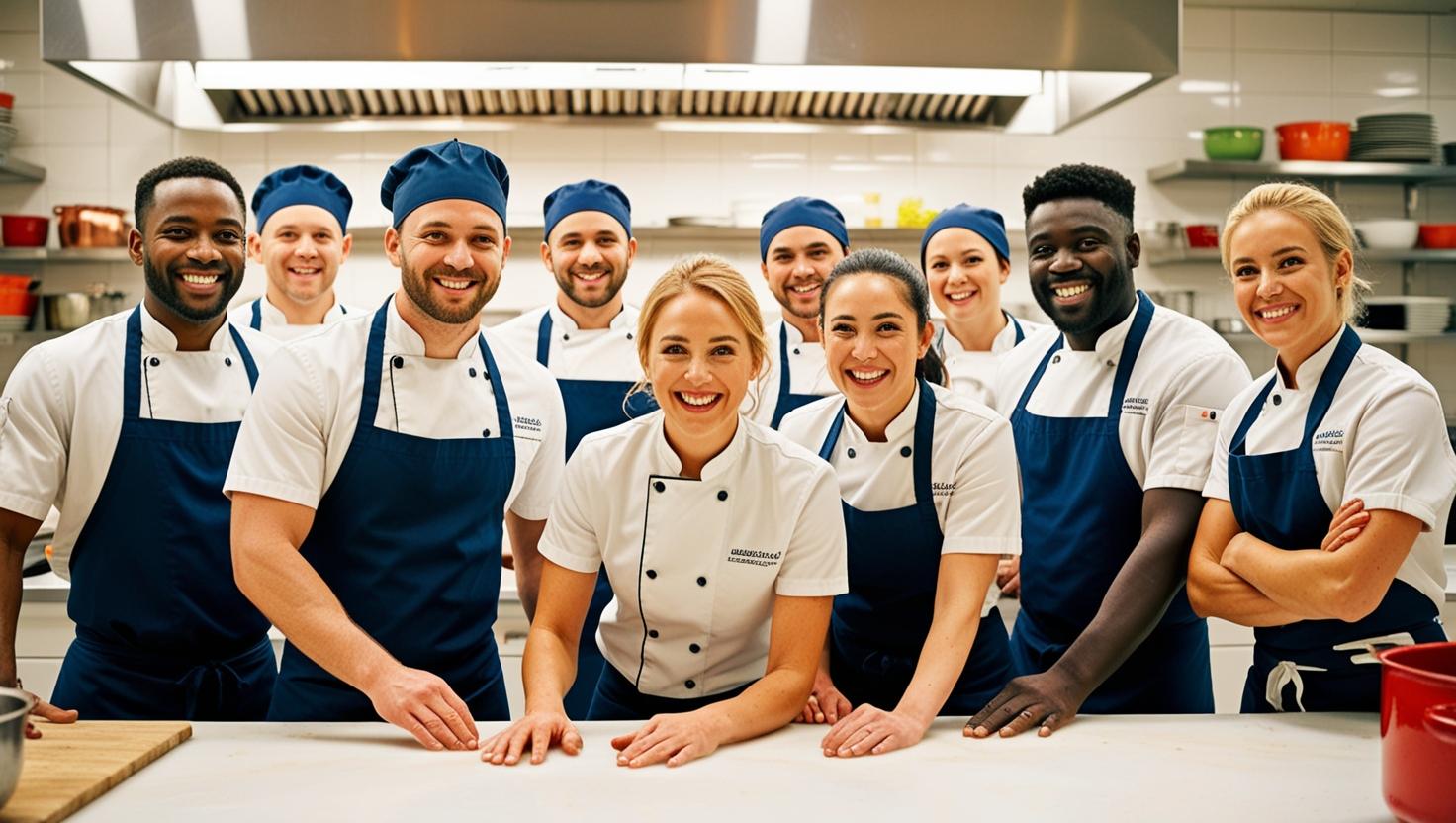Edinburgh Complete Guide to Temporary Kitchen Staff Hire: Finding Qualified Chefs and Kitchen Assistants for Hotels and Restaurants

Introduction
Edinburgh. The name itself brings to mind ancient castles, cobbled streets, and the buzz of the world’s biggest arts festival. It’s a city that’s alive with culture, history, and, most importantly, a food scene that’s absolutely exploding. From Michelin-starred restaurants to cosy pubs serving up classic Scottish fare, the city’s kitchens are the beating heart of its hospitality industry. But keeping that heart beating smoothly can be a real challenge, especially when it comes to staffing. Unexpected rushes, staff holidays, or that sudden, glorious burst of tourists can leave you feeling the heat.
That’s where the idea of temporary kitchen staff comes in, and it’s a game-changer for many hotels and restaurants. Forget the stress of long recruitment processes; hiring temporary, qualified chefs and kitchen assistants gives you the flexibility to adapt to whatever the city throws at you. This guide is your new best mate for navigating the world of temporary kitchen staffing in Edinburgh. We’ll walk you through everything, from figuring out exactly who you need to finding reliable agencies that can connect you with top-tier talent. We’re talking about making your kitchen run like a well-oiled machine, ensuring your customers get the amazing dining experience they expect in Scotland’s capital.
Why the need for temporary kitchen staff is booming in Edinburgh
Let’s be honest, running a kitchen in Edinburgh is a rollercoaster. One minute you’re enjoying a steady service, the next you’re slammed with a bus tour or a pre-theatre rush. The city’s very nature, with its massive festivals like the Fringe and the international Tattoo, means demand can skyrocket overnight. This is where the beauty of temporary kitchen staff really shines. It’s not just about covering for someone who’s called in sick; it’s a strategic way to manage the natural ebb and flow of the hospitality business. It allows you to scale your team up for the busy season without the long-term commitment of permanent contracts, and then scale back down when things quieten down. This flexibility is gold.
Moreover, the industry is facing a well-documented staff shortage. Finding good, reliable people is tougher than ever. A temporary kitchen staff agency acts as your secret weapon, giving you access to a pool of vetted, experienced professionals who are ready to jump in at a moment’s notice. These aren’t just random individuals; they are culinary pros who choose the flexibility of temp work. They bring fresh perspectives and diverse skills from working in various kitchens, which can be a massive bonus. Instead of seeing it as a last resort, think of it as building a more resilient, dynamic, and efficient kitchen team ready for anything.

The ultimate checklist for hiring temporary kitchen heroes
Bringing a temporary worker into your kitchen, even for a short time, is a big deal. You’re trusting them with your reputation, your ingredients, and the smooth running of your service. So, how do you make sure you get it right? It’s not as simple as just getting a body in the door. You need someone who can hit the ground running and fit seamlessly into your existing team. A little bit of prep work goes a long way. Think of it like a kitchen remodel for your team; you need a plan before you start knocking down walls.
Here’s a straightforward checklist to help you find the perfect temporary match for your kitchen:
- Assess your actual needs: Be specific. Do you need a Sous Chef to lead a section, or a Commis Chef for prep? Is it a Kitchen Porter for a mountain of washing up? Knowing the exact role and skill level is the first step.
- Don’t skimp on the brief: When you contact an agency, give them the full picture. Describe your restaurant’s style, the pace of service, the existing team’s dynamic, and the specific duties the temp will handle. The more detail, the better the match.
- Check their credentials: A good agency will have already vetted their candidates, but it’s always wise to ask about their specific experience, food hygiene certificates, and any specialist skills (e.g., pastry, butchery).
- Talk about a trial shift: The best way to see if someone is a good fit is to see them in action. A paid trial shift is a fair way for both you and the temp to see if it’s going to work out. It’s a bit like testing a new piece of cookware, like a
dutch ovenor anon stick frying pan, before committing to it. - Clear communication is key: Be clear about expectations, pay rates, hours, and who they report to. A good induction on their first day, showing them the layout of the
kitchenand introducing them to the team, can make all the difference.
Finding the right fit: from kitchen porters to head chefs
The term kitchen staff covers a whole spectrum of roles, each one vital to a functioning kitchen. It’s not a one-size-fits-all situation. You wouldn’t hire a Head Chef to do the washing up, and you wouldn’t expect a Kitchen Porter to design a new menu. Understanding the different roles and what they entail is crucial for hiring effectively. It ensures you’re not paying for skills you don’t need, or worse, hiring someone who isn’t equipped for the job at hand. This is about building a balanced and efficient team, where everyone knows their part.
Let’s break down some of the key temporary roles you might need to hire for:
The unsung heroes: kitchen porters
Let’s talk about the real backbone of any kitchen: the Kitchen Porter. These guys are the unsung heroes who keep the entire operation from grinding to a halt. When you’re in the weeds and the pots and pans are piling up, a good Kitchen Porter is worth their weight in gold. Their primary job is to operate the dish washer, scrub pots, and keep the kitchen clean and organised. But often, they do so much more – from basic food prep like peeling potatoes to helping with deliveries and keeping the stores tidy. They are the ultimate support system for the chefs.
When you’re looking for a temporary Kitchen Porter, reliability and a strong work ethic are the most important qualities. You need someone who isn’t afraid of hard graft and can work quickly and efficiently under pressure. They need to understand health and safety regulations and have a basic knowledge of kitchen hygiene. While formal qualifications aren’t always necessary, experience in a busy kitchen environment is a huge plus. A good agency can find you experienced porters who know exactly what’s expected and are ready to get stuck in from the moment they walk through the door.
The versatile engine: kitchen assistants
Kitchen Assistants are the versatile all-rounders of the culinary world. They are the glue that holds the kitchen line together, bridging the gap between the porters and the chefs. A great Kitchen Assistant can turn their hand to almost anything. One minute they might be chopping vegetables and preparing salads, the next they could be helping with plating, making sauces, or even working a deep-fat fryer. Their role is incredibly varied, which makes them an invaluable asset, especially when you need an extra pair of hands during a hectic service.
When hiring a temporary Kitchen Assistant, you’re looking for someone with a bit of kitchen savvy. They should have good knife skills, an understanding of basic food preparation techniques, and a solid grasp of food hygiene principles. Experience is key here, as you need someone who won’t be overwhelmed by the pace of a professional kitchen. They should be quick learners, able to follow instructions from the chefs precisely, and have a positive, can-do attitude. They’re an essential part of the team, ensuring the chefs can focus on the complex cooking while the fundamental prep is taken care of efficiently.

The creative force: chefs of all levels
From a solid Commis Chef to a seasoned Head Chef, hiring a temporary chef can be a lifesaver. Maybe your Sous Chef has gone on a last-minute holiday, or you’re launching a new menu and need some creative input. A temporary chef can bring in the specific skills you need, exactly when you need them. A Commis Chef can handle a section, a Chef de Partie can run the grill, and a temporary Head Chef can oversee the entire kitchen during a transitional period. It’s about plugging a skills gap with precision.
The beauty of hiring through a specialist agency like Catering.jobs is the quality and variety of chefs available. You can find someone with experience in your specific cuisine, whether it’s Italian, French, or modern Scottish. When you need to hire a cook temporarily, you can specify the exact skills you’re looking for. These chefs are professionals who enjoy the challenge of adapting to new kitchens. They bring a wealth of experience and can often introduce your permanent team to new techniques or efficiencies, just like a thermomix tm6 can revolutionise a home kitchen. They’re not just covering a shift; they’re adding value.
Where to find reliable temporary kitchen staff in Edinburgh
Okay, so you know you need someone, and you know the role you need to fill. Now for the big question: where do you actually find these people? You could try posting on general job boards or relying on word-of-mouth, but that can be hit-and-miss. You might get lucky, but you could also waste a lot of time sifting through applications from people who don’t have the right experience for a fast-paced, professional kitchen environment. In a city with a hospitality scene as competitive as Edinburgh’s, you need a more reliable solution.
This is where a specialist catering and hospitality recruitment agency becomes your most valuable tool. These agencies are the experts. Their entire business is built around finding, vetting, and managing a pool of talented kitchen professionals. They have a deep understanding of the industry and the specific demands of different kitchens. They do the hard work for you – checking references, verifying qualifications, and ensuring their candidates are reliable and ready to work. It saves you an incredible amount of time and stress, allowing you to focus on running your business. They have candidates ready for immediate start, which is crucial when you have an urgent chef hire situation.
Using an agency is like having your own dedicated HR department for temporary staff. They handle the payroll, the paperwork, and the logistics. All you need to do is tell them who you need and when. They have access to a wide range of talent, from kitchen staff in Grandpont to chefs across the country. Whether you need cover for a single shift or a longer-term project, they provide a streamlined and professional service that is simply unmatched.

The benefits of using a kitchen staff agency
Choosing to partner with a recruitment agency isn’t just about convenience; it’s a smart business decision that offers a multitude of benefits, especially in a high-pressure industry. The primary advantage is the immediate access to a pre-vetted talent pool. When your head chef calls in sick an hour before a fully booked Saturday night service, you don’t have time to post an ad. You need a solution, and you need it now. An agency can often have a qualified chef on their way to you within the hour, a service that is simply invaluable.
Here are some of the top benefits table:
| Benefit | Description |
|---|---|
| Speed and Efficiency | Agencies have a database of available staff ready to go. They can fill positions in hours, not weeks. |
| Quality Assurance | All candidates are vetted, their references and qualifications checked. You get reliable, professional staff. |
| Reduced Admin | The agency handles payroll, taxes, and other HR paperwork, saving you a huge amount of administrative hassle. |
| Flexibility | Easily scale your workforce up or down to meet demand, without the commitments of permanent hiring. Perfect for seasonal peaks. |
| Expertise | Agencies understand the nuances of kitchen roles and can find the perfect match for your specific needs and kitchen culture. |
| Nationwide Reach | Need to find temporary chef positions in Newcastle or staff in Nottingham? A good agency has a wide network. |
Beyond these points, agencies provide a level of reliability that’s hard to achieve on your own. If a temporary worker they send is ill or doesn’t show up, they have a responsibility to find a replacement immediately. This safety net is crucial for maintaining service standards and protecting your business’s reputation. It’s a partnership that provides peace of mind.
Integrating temporary staff into your team seamlessly
So, your temporary hero has arrived. What now? The first few hours of their shift are crucial for setting the tone and ensuring they can perform at their best. Just throwing them in at the deep end without any guidance is a recipe for disaster. A smooth integration process will not only help the temp but will also make life easier for your permanent team. It’s all about clear communication and making them feel like part of the crew, even if it’s just for a day.
Start with a quick but thorough tour. Show them the layout of the kitchen, including the different sections, the dry store, the walk-in fridge, and the wash-up area. Point out where they can find essential equipment, from pots and pans to cleaning supplies. Introduce them to the head chef and the rest of the team they’ll be working with. Explain the chain of command and who they should go to if they have questions. A friendly welcome can make a huge difference to someone’s morale and performance.
Next, give them a clear brief of their duties. Don’t assume they know your kitchen’s specific way of doing things. Explain the menu, the prep list, and any particular plating instructions. If they’re working a station, run through the setup and the ordering system. It’s also vital to cover the basics of your health and safety procedures. Taking 15-20 minutes to do a proper handover will pay off massively in the hours that follow, leading to a more efficient, less stressful service for everyone involved. It fosters a positive environment and ensures the temporary kitchen staff positions you’ve filled are truly effective.
Frequently asked questions (FAQs)
Here are some common questions we get about hiring temporary kitchen staff.
1. How much does it cost to hire temporary kitchen staff through an agency?
The cost will vary depending on the role, the level of experience required, and the urgency of the request. The agency’s fee is typically included in the hourly rate they charge. While it might seem more expensive per hour than a permanent employee, you have to remember that this rate includes all administrative costs, national insurance, and the agency’s recruitment work. It offers great value when you consider the savings in time and HR resources.
2. What if the temporary worker isn’t a good fit?
This is a rare occurrence with a reputable agency, but it can happen. The great thing about using an agency is that you can simply give them a call. They will handle the situation professionally and will work quickly to find you a suitable replacement, often on the same day. This is one of the key safety nets that an agency provides.
3. Can I hire a temporary worker for a permanent position?
Absolutely! This is often called a ‘temp-to-perm’ arrangement and it’s a fantastic way to ‘try before you buy’. If you and the temporary worker find that you’re a great match for each other, you can usually negotiate with the agency to take them on as a permanent member of your team. There might be a one-off fee for this, but it’s a brilliant, low-risk way to recruit.
4. How quickly can I get someone?
In an emergency, many agencies can get a worker to you within an hour or two, especially in a major city like Edinburgh. For less urgent requests, giving them 24 hours’ notice is ideal as it gives them more time to find the absolute best match from their pool of available kitchen staff opportunities.
5. Do I need to provide uniforms or equipment?
Most professional chefs and kitchen staff will have their own basic uniform (chef’s whites) and their own set of knives. However, you will be expected to provide any other necessary personal protective equipment (PPE), such as aprons, hats, and safety shoes, as well as all the kitchen equipment they need to do their job, from spatula to roasting pan. It’s always best to clarify this with the agency beforehand.

This Post Has 4 Comments